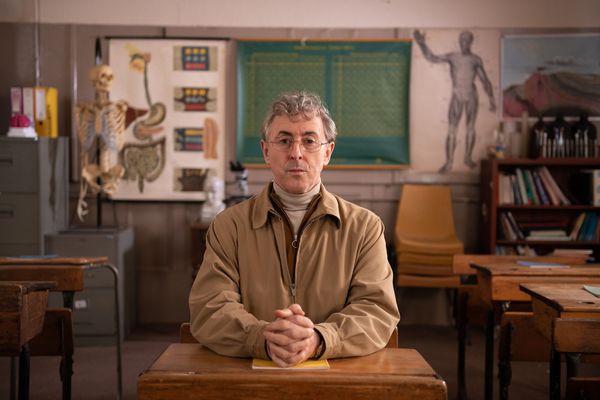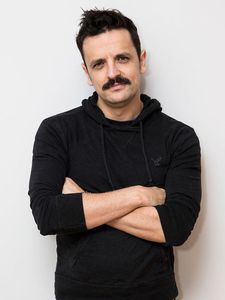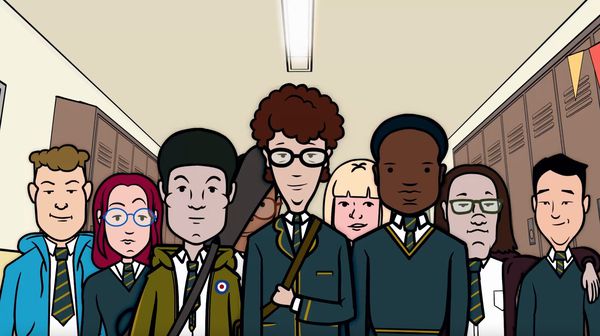 |
| Alan Cumming on lip-synching Brandon's words: 'There's talk about him being mask-like in the film and, in a way, vocally he's mask-like, as well' |
Amber Wilkinson: Was it a bit weird for you coming full circle to a subject you were originally supposed to make a film about years ago.
Alan Cumming: It's kind of lovely, actually, just come think that things come back into your life that you have forgotten about.
Given that you obviously did research on him at the time, when it was fresh in the news, has your opinion about him kind of shifted in the intervening years?
AC, jokingly: I mean, it was 25 years ago and I've done a lot of drugs. But, seriously, I definitely think that this film, and seeing it from John and the other classmates' point of view, has shifted things. I had quite a nuanced view of him, I think, but it's much more nuanced now. Because this film is more about, like the legacy he's left behind. I think, we are quick to get to judgments about people and the things they do in life, but actually 25 years later, what are these people thinking of him and what are the positive things that he left behind? As I get older that sort of fascinates me much more. Now, it's not about, necessarily, the mechanics of the story. It's about the sort of detritus left behind.
Not knowing the full story, you might expect it to be hatchet job, but he obviously had quite a positive impact on a lot of people in that school. Were you surprised when you started talking to people that he'd sort of had this kind of benevolent, kind of force about him. He's ambivalent, which is interesting, but there is definitely a positive side to some of what he did.
Jono McLeod: He was both. And what I kind of realised I could never do with the film is tie everything up in a bow and say, here's this bad person or here's this good person. The audience have to work out for themselves, at the end, what they think of Brandon and what they think of us, I suppose, as well. I never ever wanted to make a true crime, Tinder swindler, puppet master, you know, that wasn't what I was interested in making. To me, it was a high school movie, and kind of the ultimate high school movie, really.
You know, a stranger arrives in class and things will never be the same again - it's like, it's the plot of every high school movie. So, yeah, I wanted to have that warmth and have that feeling, just for it to be an enjoyable watch. And that's the reaction we got at Sundance. It felt very odd at Sundance, because we were up there with documentaries about abortion and Syria and all this kind of stuff. And here's us with this high school movie. Complete with Grange Hill credits-style sausage.
JM: Grange Hill square sausage!
I know it's a tiny thing in the film, the sausage on the credits that's almost like Grange Hill but different but I find it fascinating because it does speak to the film. Obviously, we all remember Grange Hill and we remember that sequence if you are a certain age. But then there's this twist - the square sausage - and that's not the memory that I have. The film is kind of all about that, that sense of people discovering the memory that they have of something isn't quite 'right'. Were you surprised when you were interviewing him by his perspective on things, or any of the others? Did you find yourself thinking about your own memories at the time?
JM: Not when I spoke to him, but when I spoke to everyone else? I think so. Because I think for the most part, certainly from my part, my understanding of the story over the years was very much shaped by him, because he's the only one who's ever told this story really before. He's the one who did the chatshow circuit, he's the one who did the newspaper interviews, he's the one who published his story a couple of times, sold his film rights. He's been the one kind of in charge of what the story is. And so at the start of this process, he was the man I interviewed and that was my jumping off point. When I discovered what actually happened was when I talked to everyone else,
How was the process for you, Alan? Because, you're often giving a voice to a character, maybe The Simpsons or whatever. Here you're doing basically doing everything but the voice. Does that make it a different process for you when you approach it?
AC: Yes. it's unlike anything I've ever done before. It's about listening. I mean, it's sort of that weird thing where you have to try to make the rest of your body match up to what the voice is. And it was really helpful in the way we made him look - very attractive for me, a glamour role! He doesn't move his mouth very much, and so he's not animated. There's talk about him being mask-like in the film and, in a way, vocally he's mask-like, as well. So I just started trying to match my body to the voice. And it was just this process of repeating and repeating and repeating it.
Was it just audio recording that you did?
AC: Yes, audio recording and I had the different chunks, then on the day, they were all joined together and we'd go through them and repeat, repeat and repeat until we got it right.
What was it like for you in that situation, Jono? Because obviously you have met "Brandon" not just as a child, but now. Was there a the tendency to just pull back and not say too much about the way Alan's interpreting it? Or were you trying to give him some guidance about how he is as a person?
JM: It's my first film and, for the most part I certainly wasn't offering Alan advice about this part because actually Alan's been been attached this part for longer than I've ever been making a film about it.
AC: What I'm doing is playing a man in his 50s, a very different person, who is looking back. It's completely unusual, a unique thing.
JM: It was kind of a sit back moment for me, because what we figured early in the process, was that it was so intense, the beep, beep, beep repeat beep beep beep, was so trippy and intense. I think it started off with me trying to interact but I quickly realised, no, Alan has to be in charge.
AC: It's about the repetition. If you get it slightly wrong, you've got to go straightaway again.
JM: We were doing multiple sides of shots and stuff. So it was just down to Alan to do it as many times as he felt comfortable before he wanted to move on. If we did that, and I still wasn't happy with something we might jump in and look at it again but for the most part, Alan kind of directed that bit. Actually, it's kind of cool, because Alan was meant to direct the Brandon movie.
How easy was it to get your other former classmates involved?
JM: Nobody was forced into it. Some people took a bit of convincing and certainly some people were worried about what avenue I was going down with this. There was a certain nervousness because a lot of them feel really protective of Brandon. They may not have contact with him but they certainly seem around and he's in the supermarket. So he's still a presence around town. There's a certain level of trust that everybody placed in me to make the film in a certain way. And, I mean, God knows I've agonised over it, to try and make it as sensitively as possible.
In a way, he's doing what you do, Alan. he's being an actor, you're being an actor. Did you feel sort of, you know, some sort of connection through that in a sense of the way you play people that you're not for money?In a way tried to play somebody he wasn't in order to get a career.
AC: On many levels I understand, you know, faking it and pretending to be another person. Yes, that sort of intrinsically is part of what I do. But I think more so I relate to the sort of idea of having an altered reality like, how we all do this thing where we sometimes say, 'Oh, that didn't happen' and I'm now going to just move on my life as though that thing never happened. Or I'm making up this thing that's not true. That sort of delusional thing, I find fascinating. And memory can do that for you. As you see in the film, some of the people swear blind that something happened and then we see the evidence that it happened differently.
Maybe that also is part of the reason that people are so quick to believe who he is, in a way, because once you sort of create that atmosphere of believing something, nobody wants to be the first person to go against that.
AC: I think it's fascinating how gullible people actually are. But actually it's also a positive thing - they're trusting and they want to believe. I think that's a good thing about this film, is Scottish people they're like that [throwing his arms wide], they're open to you. Rather than like this [mimics folding arms, crossing legs] - that's my impersonation of London.























